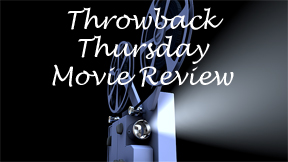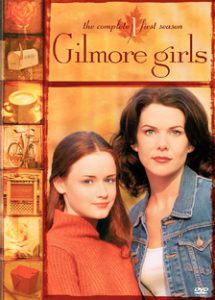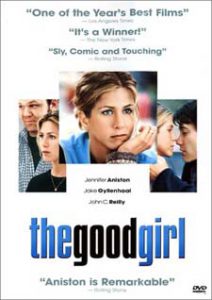“The Good Girl” was my No. 1 movie of 2002 because I admired how writer Mike White and director Miguel Arteta captured how depressing the world is. Today – as I realize it’s better for my mental health to watch things with a bit of happiness in them – I don’t enjoy the film as much, but I do appreciate it for its intelligence.
It’s interesting to watch “The Good Girl” right after reading “The Catcher in the Rye” (1951), which has never been adapted to film (as per the desires of J.D. Salinger and his estate) but which inspires the lead character here, Jake Gyllenhaal’s Tom, who goes by Holden. “Tom is my slave name,” he explains to the titular Justine (Jennifer Aniston).
Both Holdens – the 16-year-old New Yorker in Salinger’s book and the 22-year old cashier at the Texas-based Retail Rodeo in “The Good Girl” — have clinical depression, but only the original Holden finds a solution via professional help. (SPOILERS FOLLOW.) When “GG’s” Holden learns that his parents are pursuing mental-health help for him, he enters his final narrative spiral, and it turns out to be a literal death spiral.

“The Good Girl” (2002)
Director: Miguel Arteta
Writer: Mike White
Stars: Jennifer Aniston, Jake Gyllenhaal, Deborah Rush
“Catcher” is the story of a teen looking for someone to have a serious conversation with in a world of phonies. That Holden, while in love with the totally off-page Jane, is not obsessed with a single person; he’s obsessed with finding any person who gets him. He doesn’t require that it be one single soulmate; the more the better, in fact.
He only has eyes for Justine
The mental health of “GG’s” Holden is worse, as Justine is the only person in his world view. It’s also important to note that this Holden is decidedly less intelligent than Salinger’s Holden, who excels in English class and who asks intellectual questions about where the ducks go in the winter. The O.G. Holden is very much a teen, but he has an untapped pipeline to wisdom beyond his years.
As made evident by Justine’s voiceover narration of wannabe novelist Holden’s three handwritten stories, the 21st century Holden has a shallow, borderline stupid worldview. It doesn’t extend beyond being put upon and the fact that he found another soul (Justine) who is also put upon.
This is the tragic point White is making with “Good Girl” (something I realized in 2002 but which lands stronger now): Holden has a grand “literary” problem and Justine has a very typical real-world problem as she settles into repetitive, unfulfilling small-town life with a pothead husband (John C. Reilly’s Phil) after the honeymoon period has passed. Holden puts himself and Justine on a tragic pedestal rather than being able to recognize their mundanity.

Unlike Holden, Justine sees two possibilities
“The Good Girl” is a pitch-dark comedy by categorization (with Justine even briefly considering killing Holden with poisoned roadside blackberries). But I didn’t laugh all that much on this viewing, although I appreciated the craft.
I wonder if the movie would’ve landed more like 2004’s “Napoleon Dynamite” – full of weird, mouth-breathing, small-town stereotypes – except that Aniston projects as being smarter and more alive than Justine is on the page.
I always feel like Justine is too good to be working at the Retail Rodeo, married to pothead Phil and manipulated by Phil’s pothead bestie Bubba (Tim Blake Nelson). She’s had all her ambition beaten out of her by life, I suppose.
But her voiceovers are odd, especially the last one where she’s at a stoplight: One direction means a life on the run with Holden and the other means a continuation of her regular life with a dead-end job and dumb husband. Neither is appealing, objectively, but it plays like the film still wants us to think Justine sees glorious freedom in running away with Holden.
If Justine is as intelligent as Aniston’s eyes suggest (rather than what White’s screenplay suggests), then she should know Holden does not represent freedom. She’d be the primary caregiver for a mentally ill person, in addition to the more concrete fact that she’d be an accessory to a thief on the lam. (Holden has stolen $15K from the Retail Rodeo and another $5K from his folks.)
Holden’s unrecognized alternative
Going back to an earlier point, Holden’s tragedy is that he latches on to only one person – Justine — as a savior. “Catcher’s” Holden tries out several potential conversationalists, and although he’s constantly rebuffed, he views the world as a place full of people who will potentially “get him.” Indeed, he always has kid sister Phoebe in the back of his mind as someone who gets him, and Mr. Antolini diagnoses Holden perfectly. (The tragic overlay with Antolini is that he is perhaps a pedophile with ulterior motives on Holden.)
Rather than merely being dark-comic relief, I read Zooey Deschanel’s Cheryl as a secretly key character in “The Good Girl.” She’s Holden’s age, she is put upon, she acts out (making inappropriate comments over the store’s P.A. to see if anyone reacts), and I suspect she might be the smartest person in the movie.
Holden has been faking an ankle injury and “getting rides home” from Justine as a pretense for going to a hotel to have sex with her. At a time when Justine is particularly worried about being caught, she can’t give him a ride home and suggests that perhaps Cheryl can. Dropping her sarcasm for once, Cheryl is open to giving Holden a ride, but he goes off moping.
Deschanel’s character doesn’t seem like a Cheryl. I think she should’ve been named Franny, after Salinger’s Franny Glass, who – like the two Holdens under examination — is bothered by this world of phonies, although she seeks spiritual release rather than escape via a vague notion of heading out west. (Interestingly, Franny’s older brother is Zooey, whom Deschanel is named after.)
Holden’s failure of imagination
Ultimately, then, “The Good Girl” is not a tragic story of a young man living in a world where no one gets him. Rather, it’s the tragic story of a young man who mistakenly thinks he lives in a world where only one person gets him. And it’s not even totally clear that Justine gets him.
She’s a decent human being (hence the title) – she fairly quickly rejects the idea of killing Holden with the blackberries – but by taking his three ridiculous stories at face value (as is suggested by the lack of irony in her narration) one gets the feeling that she gets Holden only in a shallow sense. Or if she gets him on a deeper sense, she’s not equipped to help him – either in terms of clinical skill or desire to do so.
I’m not saying Deschanel’s Cheryl would have been Holden’s savior, but it seems she would’ve been willing to have a conversation with him. His world would’ve doubled in size if that was the case. Maybe that alone would’ve been enough to save him.

